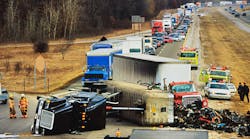The Federal Motor Carrier Safety Administration (FMCSA) has launched a comprehensive study of the causes of large truck accidents with the intention of using the data to guide its enforcement priorities for the future.
This is the first such study since the agency conducted the last one in 2001-03, which at that time included a review of 120,000 large-truck crashes. “In the more than 15 years since the original study, many changes in technology, vehicle safety, driver behavior and roadway design have occurred that affect how a driver performs,” FMCSA says.
It also pointed out that after the study ended in 2003, fatal crashes involving large trucks decreased until 2009 when they hit their lowest point in recent years—2,893 fatal crashes. Since 2009, fatal crashes involving large trucks have steadily increased to 4,415 fatal crashes in 2018, a 52.6% jump when compared to 2009. Over the last three years (2016-18), fatal crashes involving large trucks increased 5.7%.
“This study will help FMCSA identify factors that are contributing to the growth in fatal large truck crashes, and in both injury and property damage only (PDO) crashes,” the agency says, which it hopes also will lead to effective new strategies to improve safety. “These factors will drive new initiatives to reduce crashes on our nation’s roadways.”
Among the new factors that need to be taken into account since the last study that were cited by FMCSA are the dramatic increase in distraction caused by cellphones and texting, the level of driver restraint use, the advent of in-cab navigation and fleet management systems, as well as equipment designed to enhance safety, such as automatic emergency braking (AEB) systems.
It observes that the research is expected to suggest ways that will help guide the development of various levels of automated driving technology. “Knowing more about driver behaviors will identify areas where new driving automation systems can be of help, and aid in formulating performance metrics and standards that may need to be considered if they are to reduce crashes involving large trucks,” FMCSA says.
The agency also argues that because some Automated Driving Systems (ADS) are already deployed in many fleets, this study will be able to provide data on their effectiveness and help determine what crash avoidance capabilities should be incorporated into ADS innovations offered in the future on commercial motor vehicle platforms.
FMCSA also believes that findings from the study can be used to inform technology developers in the autonomous vehicle environment about the kinds of driver behaviors that need to be addressed.
Using the 15-year-old study as a guide, the new research will combine several different methods for gathering data. These include gathering crash data from post-accident investigation reports and onboard electronic recording devices, along with carrying out extensive surveys and interviews with professional drivers.
In its official Request for Information announcement, the agency requested public input addressing the following questions:
1. Should FMCSA pursue a nationally representative sampling approach, or can convenience sampling serve the needs?
2. What type of study are you recommending (for example, nationally representative vs. convenience sampling), and what are the pros and cons of this approach?
3. How important is it for the new study results to be comparable with findings of the original development of the 2001-03 study?
4. What other sources of data can enrich the new study? How can they be identified and included?
Speaking at the Transportation Research Board’s 2020 annual meeting last month, an FMCSA official reported that the new study currently is in what he termed a developmental concept stage.
“We plan to integrate our data with other datasets,” said Bill Bannister, chief of the FMCSA Analysis Division. “This will allow us to drill down into the types of circumstances surrounding crashes, the differences among the types of crashes, and whether it’s the vehicles involved or the roadway that’s involved. This sort of information might provide predictors of crashes.”

